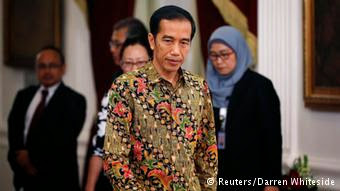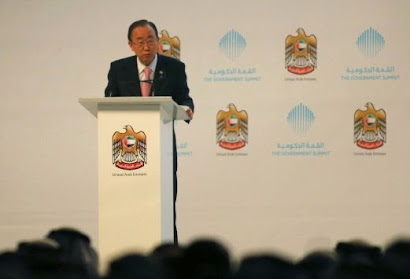 |
| Ride-hailing apps like the Grab motorcyle-taxi seen here are denting the fortunes of traditional three-wheeled bajaj taxis in Indonesia (AFP Photo/BAY ISMOYO) |
Auto-rickshaw driver Zainuddin used to make decent money navigating Jakarta's congested roads and narrow alleyways.
But now
US-based Uber, Google-backed Go-Jek and Singapore's Grab are locked in a race
for ride-hailing app supremacy in Southeast Asia's biggest economy, denting the
fortunes of traditional three-wheeled bajaj taxis that once ruled Indonesia's
roads.
"Our
income has fallen between 70 and 80 percent since ride-hailing apps came on the
scene," said Zainuddin, who like many Indonesians goes by one name.
There were
some 14,000 bajaj on Indonesia's roads by 2015, according to the latest
official figures.
By
contrast, Go-Jek alone claims 900,000 drivers and some 15 million weekly active
users. It launched in 2010.
Google and
Singapore's sovereign wealth fund Temasek have announced investments in Go-Jek,
which has been valued at as much as $5 billion although it's little known
outside Asia.
Southeast
Asia's ride-hailing market more than doubled in two years to some $5 billion in
2017 and it's expected to reach $20 billion by 2025, with Indonesia set to
account for some 40 percent of it, according to research done by Google and
Temasek.
Go-Jek,
which also reportedly won funding from Chinese internet giant Tencent, has said
it is mulling an initial public offering as it looks to grow in Indonesia and
beyond.
That could
inflate its army of motorcycle taxis, private cars and other services -- from
massage and house cleaning to grocery shopping and package deliveries -- all
available at users' fingertips.
Dragging behind
its regional rivals, Uber is reportedly selling parts of its Southeast Asian
operations to rival Grab in exchange for a stake in the Singaporean company.
No more
haggling
The
ride-hailing trio offer fixed-price rides that take haggling out of the
equation, a welcome change for former bajaj customer Tetty Iskandar.
"I
haven't taken a bajaj in years," said the 35-year-old housewife, who used
to ride the three-wheelers to go grocery shopping.
"You
had to bargain with the drivers to get cheap fares. And you would already have
done bargaining a lot in the market. Sometimes I felt so tired and just wanted
to get home."
The vast
archipelago of some 260 million people has a relatively low per-capita car
ownership rate.
And vehicle owners often choose to leave their ride at home, opting instead for a fixed-price motorcycle that can zip through Jakarta's epic traffic congestion -- at a bargain-basement prices.
 |
For some,
sitting in a tuk-tuk as it teeters and rumbles over Jakarta's roads offers
a
connection to an older way of life (AFP Photo/BAY ISMOYO)
|
And vehicle owners often choose to leave their ride at home, opting instead for a fixed-price motorcycle that can zip through Jakarta's epic traffic congestion -- at a bargain-basement prices.
That is
threatening bajaj -- not to mention regular cabs and ubiquitous motorbike taxis
known as ojek -- which arrived in Indonesia during the 1970s.
The
motorised rickshaw quickly made inroads under its namesake company, which
hailed from India.
The name
bajaj is now inked into Jakarta's lexicon after supplanting traditional bicycle
taxis.
A
distinctive blue model of the vehicle is still a common sight and while
pollution-spewing older models are outlawed, some still ply the narrow
alleyways of Indonesia's sprawling capital.
Government
efforts to reduce traffic snarls by reintroducing bicycle taxis could further
chip away at the market share of bajaj, which cannot operate on highways and
certain busy streets.
'Nostalgic feeling'
Still,
bajaj backers point out that the little tuk-tuks are safer than motorcycles
which have higher injury and fatality rates.
"They
are still a very useful means of transport when you have to go through small
alleys and roads in Jakarta," said Danang Parikesit, president of the
think tank Indonesia Transportation Society.
For some,
sitting in a tuk-tuk as it teeters and rumbles over Jakarta's roads offers a
connection to an older way of life.
"Riding
bajaj has a unique sensation, a nostalgic feeling," said faithful customer
Budiyanto.
In central
Jakarta, bajaj line a curb, their drivers smoking or sleeping as swarms of
motorbike drivers sporting Go-Jek or Grab windbreakers zip by on their way to
collect customers.
Even if
they wanted to switch to ride-hailing apps, it's too late for some older
drivers.
"I
cannot shift to an app-based motorcycle taxi because of my age," said
driver Sutardi.
"Companies
require that their drivers not be over 60."
Despite the
threat of technology, some insist bajaj have a future, especially among customers
who don't want to get soaked on the back of a motorbike or while waiting for a
hired car during the months-long rainy season.
"Customers
don't like to get wet," tuk-tuk driver Zainuddin said.
"It's
not good for people when the rain comes, but bajaj drivers will be happy."
VIDEO: Auto-rickshaw drivers used to make decent money navigating Jakarta's congested roads and narrow alleyways. But now US-based Uber, Google-backed Go-Jek and Singapore's Grab are locked in a race for ride-hailing app supremacy in Southeast Asia's biggest economy pic.twitter.com/K0JkBB9GDZ— AFP news agency (@AFP) March 25, 2018









